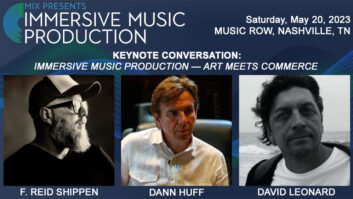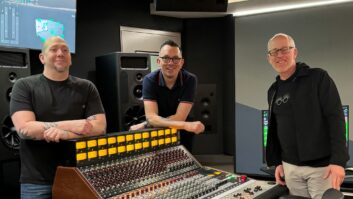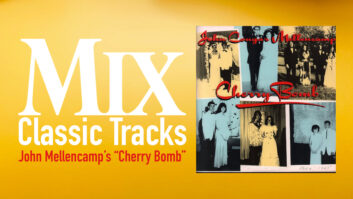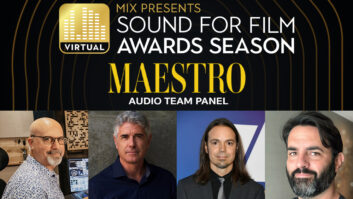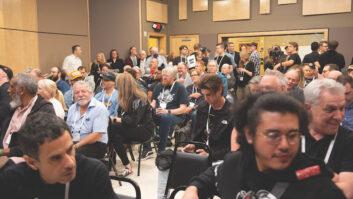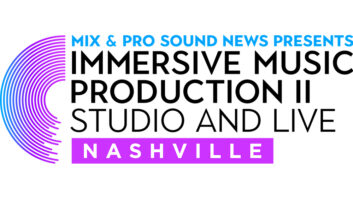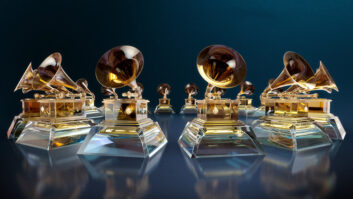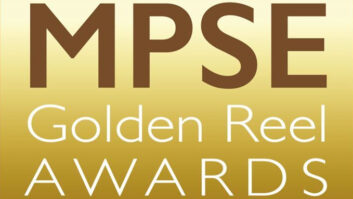
Leonard Cohen (left) and Mr. Bonzai, 2002.
Photo: Leanne Ungar.
I first met Leonard Cohen in 1988, as editor-at-large with Mix magazine, for my monthly “Lunching with Bonzai” column. I appeared at his doorway with my wife Keiko, holding a bottle of Chianti and three chili dogs from Pink’s. I’d heard that Leonard liked junk food. In a classy, three-piece grey suit and shoeless, with a 5 o’clock shadow, he escorted us to his dining nook and set up fine china and silverware for our repast. The conversation was thoughtful and un-rushed. Before we left, I gave him a copy of my first book, Studio Life. He walked over to his bookcase, took out the only copy of Death of a Lady’s Man, signed it and gave it to me.
From Mix magazine, 1988: “Haute Dog”
Do you have a magical relationship with your musical tools?
I think it is the opposite of magical. Magical is the word we give to relationships that we can’t understand. I’m not very interested in the occult, especially the sensibility that goes with it and the kinds of things that people who are interested in the occult ask to be forgiven for. I’m not interested in that pursuit, but I do know that inanimate objects, especially when they have working parts, and depend on things like sound and light, are susceptible to the influence of the people who are working with them.
If we could invite one person to join us here today, from anyplace in the world, any place in history, is there anybody you would like to meet and talk to?
I don’t like to disturb people, or stir the dust of graves, or summon people from their ordinary days.
If you could choose the music for your own funeral, what would you like played?
Well, you know, I don’t like music very much, like most musicians. So, maybe they could pass on that. By that time—which could be any time from now on—the musical saturation has become so thorough, that this might be one of the few spots where there is no music. I would appreciate that.
Is there any old proverb, any old saying that you dislike?
Dislike? There’s one I like very much. I believe it’s Chinese, and it goes like this: “Why do you hate me? I never helped you.” I like that saying because it evokes the complexity of a relationship, a friendship. Whether it’s accurate or not is really not important. It evokes the complexity that is the background of any relationship.
Do you think you’ve made any enemies through the years?
(pauses thoughtfully) Probably not enough.
On the music industry side of things, do you know any useful business advice that people entering the business might benefit from?
Well, I remember when I went down from Montreal to New York with the intention of establishing myself in the music business. I was not a boy. I was in my early thirties and my mother said to me, “Leonard, be careful—those people aren’t like us.” I was very resentful of my mother suggesting that she could tell me anything about things. But you know, she was right. They aren’t like us. So, that’s a good thing to remember. Whatever you think it’s going to be, it’s not going to be like that. However how crooked you might have heard it is, it’s going to be a lot more crooked than that.
How long does love last?
Well, it lasts just like all the songs say. It lasts forever.
• • • • •
The photo above is from 2002, when I interviewed Leonard’s recording engineer, Leanne Ungar, in his modest studio over a garage. Leonard and I stood in his kitchen while he prepared the coffee carefully, grinding the beans, pouring the hot water, and then assembling cream and sugar on a tray that he carried to our sitting zone.
We met one last time in 2006, at a Starbucks on Wilshire Blvd. and exchanged books once again. My Faces of Music, which included this interview, and his illustrated Book of Longing, inscribed “To MrB and Keiko, with Gasshos Galore, Leonard Cohen.”
Last month, I pre-ordered Leonard’s new album, You Want It Darker, and absorbed its haunting presence while he was still with us. It is forever touching, personal, poignant, and pushes a few dark buttons that will continue to resonate in his remarkable body of work, his “Tower of Song.”
With Gassho
(Japanese; hands pressed together in reverence, gratitude)
